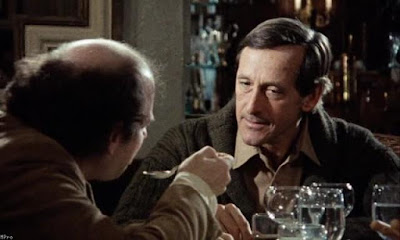Saturday, December 11, 2010
My Dinner with Andre
On a quiet, rainy sunday night, I watched for the first time the brilliant movie, My Dinner with Andre. Over the course of a two hour meal, these two masterful storytellers recount their experiences and talk of the theatre, life, art, and what it means to live. Watching this is like eavesdropping on the conversation at the next table in a posh restaurant, and one can easily imagine the stories as they're told rather than watch a series of flashback sequences. This of course goes counter to a typical cinematic experience and especially the mantra in screenwriting to "show, don't tell." But even so, this movie works for me probably because I have a pretty active imagination and could easily visualize this film in my mind's eye. And after hearing the line "I could also live in my art but never in my life," I was hooked. I could sympathize with that sentiment from a writers' and artists' perspective, but it is a devastating and tragic way to live, no?
There were many other ideas explored through dialog that I found intriguing and I was struck with how timely my viewing of this movie occurred in light of my last blog entry.
What does it mean to be alive, truly alive?
"Most people I met thought there was something wrong with me. They didn’t say that, but I could tell that that was what they thought. But see, what I think I experienced was for the first time in my life, to know what it means to be truly alive. Now that’s very frightening because with that comes an immediate awareness of death because they go hand in hand. The kind of impulse that Walt Whitman in Leaves of Grass, that feeling of being connected to everything, it means to also be connected to death. And that’s pretty scary, but I really felt as if I were floating above the ground, not walking…"
Andre's central thesis is that the modern age is stripping us of our humanity.
“You see, I think it's quite possible that the nineteen-sixties represented the last burst of the human being before he was extinguished. And that this is the beginning of the rest of the future now, and that from now on there'll simply be all these robots walking around, feeling nothing, thinking nothing.”
We aren't acting like true and honest people instead we're take up roles which are related to our occupations. We conform ourselves to narrow pursuits and expectations instead acting out of our own genuine desires.
“I've acted the role of the husband, I've acted the role of the friend, I've acted the role of the writer, director, what have you. I've lived in the same room with this person but I haven't really seen them. I haven't really heard them. I haven't really been with them.”
We are so dissconnected from other people that we know very little about the lives of our closest friends.
“I mean, we live in such ludicrous ignorance of each other. I mean, we usually don't know the things we'd like to know even about our supposedly closest friends!”
In a way, I envisioned myself in Wally's character who having spent that fictitious evening with his friend Andre, summed up his thoughts about his own way of looking at life. He didn't need Mount Everest to have this life-affirming realization.
"Tell me, why do we require a trip to Mount Everest in order to be able to perceive one moment of reality? I mean...I mean, is Mount Everest more "real" than New York? I mean, isn't New York "real"? I mean, you see, I think if you could become fully aware of what existed in the cigar store next door to this restaurant, I think it would just blow your brains out! I mean...I mean, isn't there just as much "reality" to be perceived in the cigar store as there is on Mount Everest?"
Wally lives a simple life and can find joy in the simple things. Isn't it enough to feel more alive in those moments without having to resort to bold gestures? I'd like to think so.
Punchlines
I too love cats. I love 'em. I play with 'em. I touch 'em. I...
Judge: Thank you, that will do. The defendant may be seated.
Subscribe to:
Post Comments (Atom)


This comment has been removed by the author.
ReplyDelete